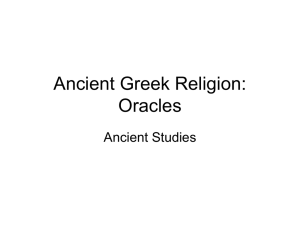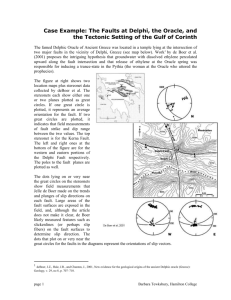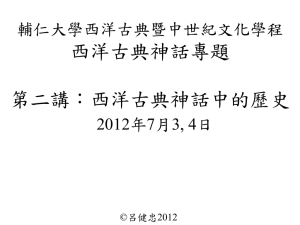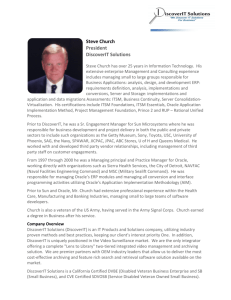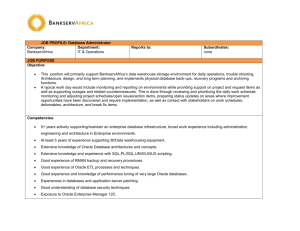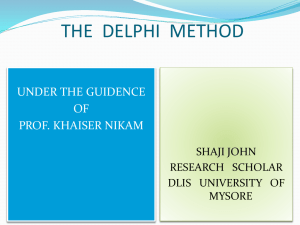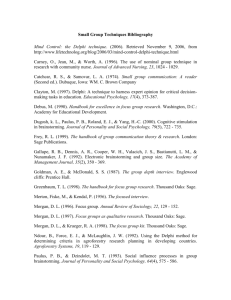greek report
advertisement
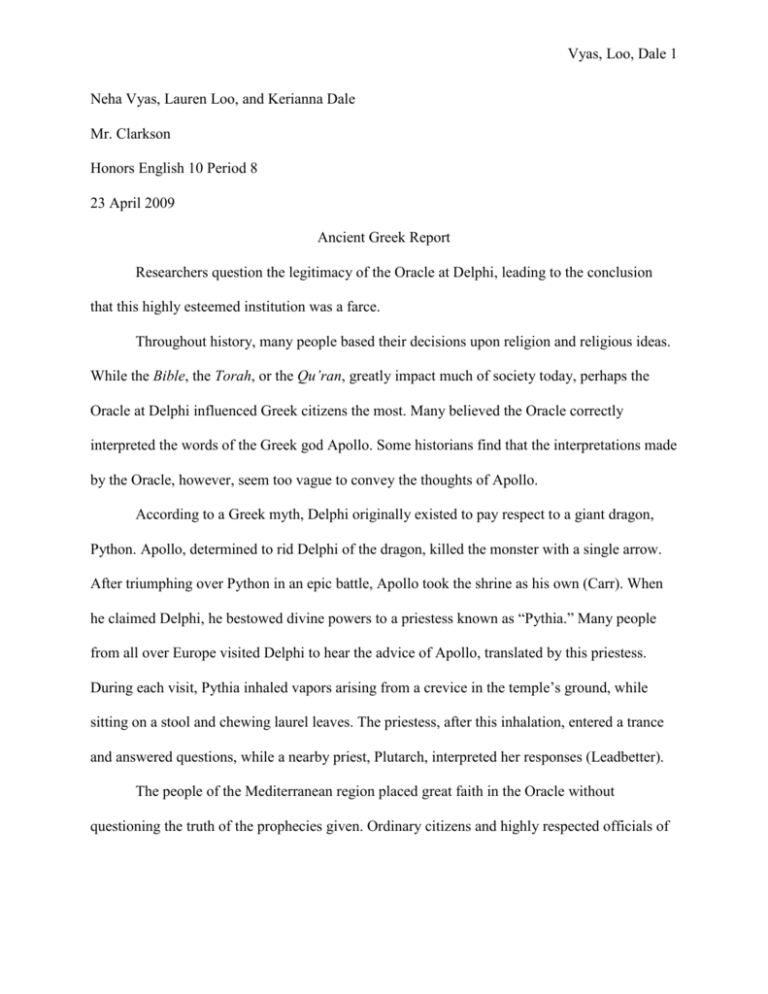
Vyas, Loo, Dale 1 Neha Vyas, Lauren Loo, and Kerianna Dale Mr. Clarkson Honors English 10 Period 8 23 April 2009 Ancient Greek Report Researchers question the legitimacy of the Oracle at Delphi, leading to the conclusion that this highly esteemed institution was a farce. Throughout history, many people based their decisions upon religion and religious ideas. While the Bible, the Torah, or the Qu’ran, greatly impact much of society today, perhaps the Oracle at Delphi influenced Greek citizens the most. Many believed the Oracle correctly interpreted the words of the Greek god Apollo. Some historians find that the interpretations made by the Oracle, however, seem too vague to convey the thoughts of Apollo. According to a Greek myth, Delphi originally existed to pay respect to a giant dragon, Python. Apollo, determined to rid Delphi of the dragon, killed the monster with a single arrow. After triumphing over Python in an epic battle, Apollo took the shrine as his own (Carr). When he claimed Delphi, he bestowed divine powers to a priestess known as “Pythia.” Many people from all over Europe visited Delphi to hear the advice of Apollo, translated by this priestess. During each visit, Pythia inhaled vapors arising from a crevice in the temple’s ground, while sitting on a stool and chewing laurel leaves. The priestess, after this inhalation, entered a trance and answered questions, while a nearby priest, Plutarch, interpreted her responses (Leadbetter). The people of the Mediterranean region placed great faith in the Oracle without questioning the truth of the prophecies given. Ordinary citizens and highly respected officials of Vyas, Loo, Dale 2 Greek and foreign origin paid high prices for Pythia’s insight. Few people made major decisions without seeking advice from the Oracle first ("The Greeks - The Oracle at Delphi"). Because of the Oracle at Delphi’s undeniable power, ancient folk referred to the Oracle as the center of the world, also referred to as “Omphalos” (“Delphi”). The Oracle at Delphi often provided vague insight, leaving room for interpretation. Because people could decipher prophecies however they chose, the Oracle consistently provided accurate information. One example of the ambiguity of the Oracle at Delphi involved Croesus, King of Lydia. Wanting to enter Persia, Croesus sought the advice of the Oracle. The priestess, Pythia, told Croesus that a nation would fall upon the crossing of the Persian border. The King of Lydia, assuming that Persia would fall, continued to enter Persia. Upon penetrating the border, however, Lydia fell. The lack of clarity in the Oracle’s advice allowed the prophecy to be correct (“Responsible Thinking: Vague Claims”). In conclusion, while the Oracle at Delphi held an esteemed position in the lives of ancient people, the institution failed to provide adequate guidance. Ancient civilizations placed too much emphasis on the Oracle at Delphi, which only offered vague instruction. The price that people paid for advice, in combination with the ambiguity indicates that the Oracle at Delphi was simply a sham. Vyas, Loo, Dale 3 Works Cited Carr, Karen. "Delphi." Kidipede. Kidipede. 30 Mar. 2009 <http://www.historyforkids.org/learn/greeks/religion/delphi.htm>. "Delphi." Ancient Greece. Ancient Greece. 30 Mar. 2009 <http://ancientgreece.org/history/delphi.html>. "The Greeks - The Oracle at Delphi." PBS. PBS. 30 Mar. 2009 <http://www.pbs.org/empires/thegreeks/background/7_p1.html>. Leadbetter, Robert. "Apollo." Encyclopedia Mythica. Encyclopedia Mythica. 30 Mar. 2009 <http://www.pantheon.org/articles/a/apollo.html>. "Responsible Thinking: Vague Claims." Responsible Thinking. Responsible Thinking. 30 Mar. 2009 <http://www.truthpizza.org/logic/vague.htm>.
